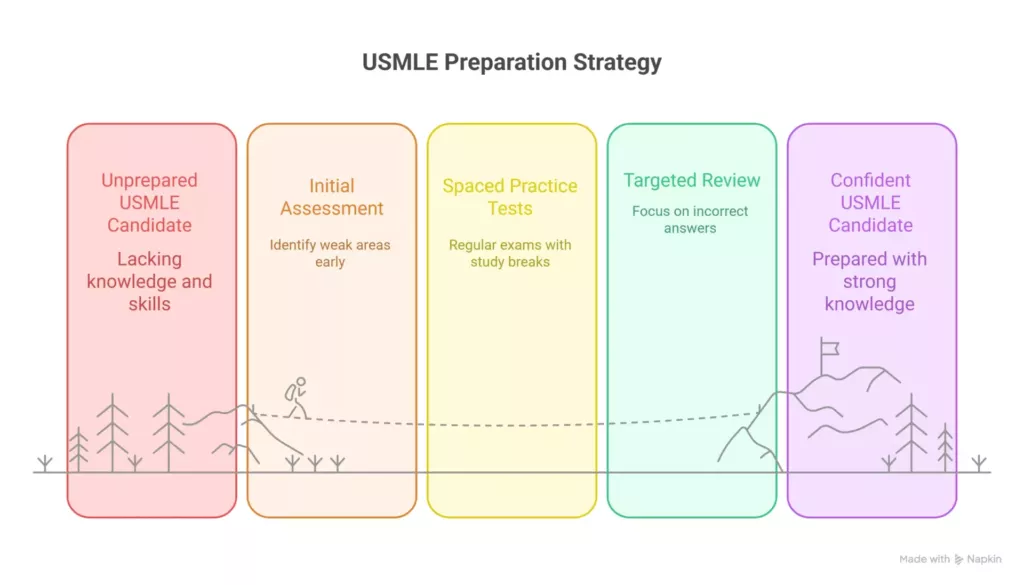What is the NBME Exam and When Should You Take It?

You’re probably putting in many hours preparing to be licensed in the US, but are you truly ready for the USMLE? The only way to know is through the NBME exams, the official preparatory medical tests developed by the National Board of Medical Examiners.
In this blog, we’ll break down what NBME self-assessments are, explain why they're the gold standard for assessing readiness, and walk you through the formats, pricing, and what you need to succeed.
Please note: all prices in this blog are accurate as of October 2025, but are subject to change.
The key takeaways of this blog are:
- NBME exams are the official preparatory medical exams that test your readiness for the USMLE
- They cover steps 1, 2 and 3 of the USMLE, as well as specialty exams and IFOM
- Ignoring NBME practice exams can be a serious mistake in USMLE preparation
- Choosing a medical school that actively works with you for your success is essential for excelling in NBME self-assessments and the USMLE
Table of Contents
- 1 What is The NBME Exam?
- 2 NBME Formats and Pricing: How To Take It, Options, Cost
- 3 Why You Should Do the NBME Practice Exams
- 4 What Are CBSSA, CCSSA and CMSSA?
- 5 NBME Speciality and International Exams
- 6 NBME Subject Exam Schedule and Study Tips
- 7 The University's Role in NBME Prep
- 8 Why This Matters to You
- 9 FAQ
What is The NBME Exam?
The NBME practice exams are official prep tests that mirror the content, structure, and scoring of the USMLE exams.
These assessments give you an accurate idea of how ready you are for the USMLE Step 1, Step 2, and Step 3, along with helpful feedback that highlights the areas where you can improve.
In fact, some medical universities, like the University of Health Sciences Antigua, specifically build NBME and USMLE preparation into their curriculum as part of the resources and support that ensure student success.
NBME Formats and Pricing: How To Take It, Options, Cost
To do the NBME practice exams, you’ll have to visit the website’s portal. This is where you’ll be able to purchase and take them online. Each self-assessment form costs $62 (€53), typically granting you access to a single exam.
The Self-Assessment tests are available in 2 forms, each containing 200 multiple-choice questions.
- Standard-Paced Format: Adds the pressure of real exam conditions with 4 sections of 50 questions (1 hour and 15 minutes each).
- Self-Paced Format: Offers the same structure but allows up to 5 hours per section, allowing you to review each question more thoroughly.
Your score is shown as a total equated percent correct score out of 100, adjusted so that different test forms are equally fair. You’ll also see a likely score range showing how your score might vary if you retook the exam, usually within about 4 points higher or lower.
Why You Should Do the NBME Practice Exams
Some students underestimate the NBME practice exams, and here is why ignoring them can be a serious mistake in your USMLE preparation:
- Students are allowed 3 attempts at the USMLE. However, your NBME attempts are unlimited, and their results predict your step performance.
- The self-assessments are made by the same board that works on the USMLE, and the questions you’ll see will match the real exam.
- Scores are also available immediately after completing the self-assessment so that you can adjust your study plan right away.
- Taking these scores lightly can mean walking into your USMLE blind to your weak spots, wasting months of prep, and risking a lower overall score
What Are CBSSA, CCSSA and CMSSA?
Similar to the USMLE, the NBME self-assessments are divided into 3 steps: CBSSA, CCSSA, and CMSSA. These 3 are divided into 2 major parts: systems and physician tasks.
- The Comprehensive Basic Science Self-Assessment (CBSSA) takes on the basic sciences, or the content of USMLE Step 1. It covers areas such as biochemistry, molecular biology, genetics, microbiology, pharmacology, pathology, and key organ systems.
- The Comprehensive Clinical Science Self-Assessment (CCSSA) reflects USMLE Step 2, as in clinical knowledge and the application of science to patient care. It includes organ systems, behavioural health, medical ethics, diagnostics, pharmacotherapy, and patient management.
- Finally, the Comprehensive Clinical Medicine Self-Assessment (CMSSA) aligns with USMLE Step 3 and focuses on the Foundations of Independent Practice (FIP) and Advanced Clinical Medicine (ACM).
NBME Speciality and International Exams
NBME offers other exams designed to test your mastery of specific subjects during your medical school rotations or to meet international requirements.
Clinical Science Mastery Series (CMS), often referred to as "Shelf Exam Practice," evaluates your practice test for clerkship subjects; these include the surgery shelf NBME CMS forms as well as the paediatrics shelf CMS forms. It uses real, retired questions from the official NBME Shelf Exams, making it the best way to master the content of your rotations.
As for international standards, the NBME offers the International Foundations of Medicine (IFOM®) Clinical Science Self-Assessment. It prepares you for the IFOM Clinical Science Examination (CSE), which is often a requirement for residency or clinical training in specific international locations.
NBME Subject Exam Schedule and Study Tips


NBME can be taken at any time. However, it’s best to plan your assessments properly:
- Do your first NBME assessment as soon as you can. Don’t wait till you have 1 week for the USMLE, as you have to identify and work on your weak spots.
- Spread out your practice tests, taking 1 every 2-4 weeks. This allows enough time to study and learn from previous exams.
- After each test, review the questions you got wrong, understand why, and spend more time on your weak spots rather than what you already know.
- Take NBMEs in a quiet place using the timed option. Only use self-paced tests early on, not weeks before the exam, to get used to the time pressure.
The University's Role in NBME Prep
Passing the USMLE isn't just about personal study; it's also about the quality of education and support your school provides. Many medical universities may promise "USMLE-ready" training, but their curriculum can fall short of the rigorous standards demanded by licensing exams.
However, you can choose a school that actively partners with you for success.
This is why it is essential to study medicine abroad in medical universities that invest directly in this process. Schools like the University of Health Sciences School of Medicine in Antigua & Barbuda (UHSA) can help you by providing necessary resources, structured subject exam preparation, and curriculum support designed specifically to help you excel on your NBME self-assessments and, ultimately, the USMLE.
Book a free consultation with Medlink Students today and let us help you choose a path where success is built into the curriculum.
Why This Matters to You
Too many medical students make the mistake of treating the NBME as just another optional practice test. It isn’t. The NBME exams are the only official predictors of your real USMLE performance, and ignoring them can cost you months of study time, and worse, delay being licensed.
What’s worse is sitting for the NBME and realising you’re not as prepared as you thought, not because you didn’t work hard, but because your university never gave you the proper tools or guidance to succeed. The solution is simple: Choose an accredited medical school that ensures USMLE eligibility and actively supports you in achieving your dream. Book a free consultation with 1 of our expert advisors at Medlink students today, and let us help you become a doctor in the US.
FAQ
What Are The NBME Mock Exams?
NBME mock exams are official, standardised practice tests that mimic the USMLE to predict your score and highlight weak spots.
What’s The NBME Self-Assessment Accuracy?
The NBME mock exams are highly accurate. This is because they use real questions written by the same board that creates the official USMLE exams, making them the best tool to predict your score.
What’s The NBME Exam Cost?
Each of the NBME practice exams form costs $62 or €53.
What Is The Difference Between CBSE vs CBSSA?
The Comprehensive Basic Science Examination (CBSE) is an exam administered by medical schools that evaluates a student’s understanding of basic sciences. Meanwhile, the CBSSA is an assessment tool that can help students prepare for the USMLE exams.
What’s The Difference Between NBME Standard vs Self-Paced?
The standard-paced option gives you 1 hour and 15 minutes to finish each of the 4 sections of 50 questions, the same amount of time you would have on the real test. The self-paced option, on the other hand, gives you 5 hours for each section so you can go over them more carefully.
How Do I Plan My NBME Subject Exam Schedule?
Start early and space out your assessments to give yourself time to review each 1. Consider increasing the frequency as the USMLE approaches to track your progress.
Leave a Reply


About Medlink Students
Leading international recruitment company for medical students in Europe. British Council Certified Agents. 10+ years of experience and more than 10,000 students advised.








